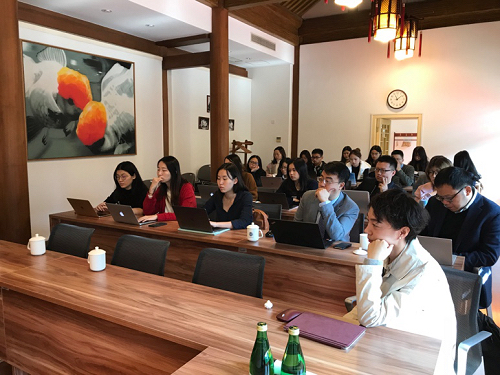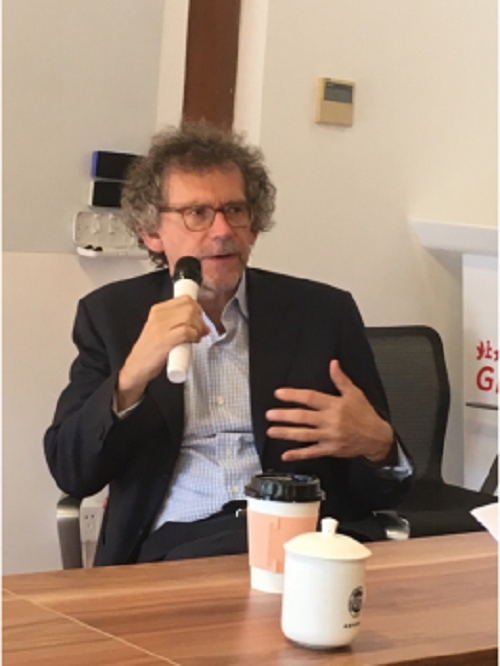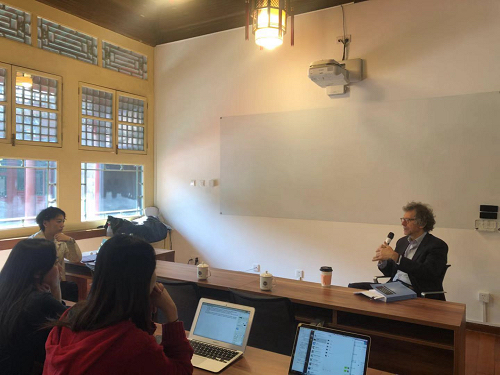Lecture on "the Formation, Development and Main Problems of New York Convention" was Successfully Held at International Commercial Arbitration
Date:2018-11-05
On October 18, 2018, the lecture on "the formation, development and main problems of New York Convention" was held in Room 303 of the Courtyard of Peking University Law School. The lecture was presented by Mr. Gary Born, authoritative expert in international arbitration, and the Chairman of the Singapore International Arbitration Center,. Gao Wei, A.P of Peking University Law School hosted the lecture. A.P Liu Zhewei, and assistant professor Cao Zhixun attended as guests. More than 20 listeners from both inside and outside the school attended the lecture.

Before the lecture officially began, Mr. Gary Born interpreted the topic of the lecture. He noted that the New York Convention, with 159 contracting States, was a global charter for international commercial arbitration. And it provides a model for other types of arbitration, such as investment arbitration and interstate arbitration. The year of 2018 is the 60th year of New York Convention, and under such background, the topic of this lecture is very meaningful.

Mr. Gary Born first introduced the history of the New York Convention. Before the 1920s, arbitration agreements, especially those to settle future disputes, were often not recognized. It was not until the signing of the Geneva Protocol on Arbitration clauses and the Geneva Convention on the Enforcement of Foreign Arbitral Awards in the 1920s that the validity of the arbitration agreement and the enforcement of the arbitration agreement among the Contracting States were guaranteed by international law. However, due to the small number of ratifications and the effects of the second World War and the Cold War, the impact of these two legal instruments was very limited. In the Spring of 1958,representatives of 48 countries met in New York to discuss the draft of legal document proposed by the International Chamber of Commerce,which aimed at improving the Geneva Convention on the Enforcement of Foreign Arbitral Awards. Finally, the New York Convention, which covers both the arbitration agreement and the arbitral award, was adopted. Next, Mr. Gary Born briefly introduced main contents of the New York Convention and points out several important issues in the New York Convention. For example, although the full name of the Convention is the Convention on the recognition and Enforcement of Arbitral Awards, the content of the Convention relates not only to arbitral awards but also to arbitration agreements. In addition, the meaning of "foreign" in the foreign arbitral awards does not necessarily mean the opposite of "domestic". The arbitral award governed by the New York Convention not only includes awards made outside the recognizing and enforcing country, but also includes an arbitral award that the recognizing country considers not to be a domestic award.

During the idea-exchanging session, audiences discussed with Mr. Gary Born whether the determination of non-domestic arbitral awards and whether international commercial arbitration should be set an appeal procedure, and whether the laws governing the arbitration clause in the contract are equivalent to the laws applicable to the contract. They also discussed whether the principles and regulations of international commercial arbitration could be applied to other types of arbitration. At the end of the lecture, Mr. Gary Born pointed out that we should judge the role and impact of the New York Convention from a dynamic, long-term perspective. At the same time, he expected the audiences would make great progress in the field of arbitration. Finally, the lecture ended with warm applause.




